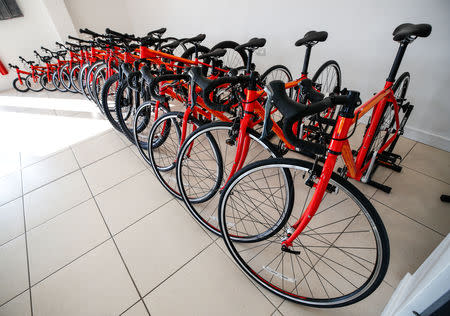Counting cost of stockpiling, UK bike maker gears up for Brexit
By Andy Bruce
LONDON (Reuters) - Isla Rowntree, the founder of British children's bike maker Islabikes, has resorted to stacking spare parts in meeting spaces and office rooms as she gets ready for a potentially chaotic no-deal Brexit next month.
But the inconvenience of finding the space for six months' worth of stock is small compared with the financial consequences, she says.
Islabikes decided in September that it needed to prepare for the risk of delays at Britain's ports after Brexit by stockpiling the parts it buys from a supplier in Vietnam at its premises in Ludlow, a pretty market town in western England.
Its preparations are typical of many companies -- including world famous firms such as Rolls-Royce, Airbus, luxury group Burberry -- who have depended on the ability to move goods easily between Britain and the rest of the world.
They are facing the possibility of border delays from new EU customs checks on goods after March 29, unless Prime Minister Theresa May can win new concessions from the EU that heal the split within her Conservative Party.
British factories last month stockpiled goods at the fastest rate seen in any Group of Seven nation since records started in the early 1990s, according to the closely watched IHS Markit/CIPS surveys.
Far from a simple act of preparation that can be reversed easily, stockpiling will have big consequences for manufacturers' finances, no matter how Brexit turns out.
"It has a massive, massive cashflow implication," said Rowntree, a former professional cyclist who started Islabikes after realising that most children's bikes were heavy and poorly designed.
She founded the company in 2006 and it now employs 40 people. It designs and assembles its bikes in Ludlow, mostly for the domestic market but 25 percent of its sales go to continental Europe.
"Even if (Brexit) goes smoothly, we will end up with a drastically reduced operating profit at the end of the year because we had to spend all this extra money on warehouse space. And that's money that we can't invest in the future of the business," Rowntree said.
Repeated across the economy, that scenario might limit any rebound in business investment, even if London and Brussels strike a deal in the coming months.
Investment by companies in Britain has fallen for four consecutive quarters, the longest such run since 2009 when the economy was in the grip of the global financial crisis.
Rowntree said Islabikes was able to finance its stockpiling operation itself. "But for a lot of businesses that obviously wouldn't be an option," she said.
GEARING TROUBLE?
There are growing signs of financial stress for Britain's factory sector.
Bank of England figures show manufacturers' overdrafts as a percentage of business overdrafts, outside the financial sector, rose in December to the highest level since April 2016, at just under 20 percent.
It was the biggest jump by this measure in three-and-a-half years.
And on the ground, those who keep a close eye on the health of British companies are now worried that manufacturers are over-stretching themselves financially by stockpiling goods.
Stocks of goods are not easy to use as collateral for loans because security can be complicated, with responsibility often split between lenders and suppliers.
"If they can't raise the finance to do that by going to a funder -- borrowing by way of debt -- typically it comes out of the cashflow," said Colin Haig, insolvency partner at accountants BDO.
Haig estimates there is a three- to six-month lag between early reports of companies becoming financially over-stretched and insolvency problems, such as breaches of financial covenants, that draw the attention of insolvency practitioners.
"I do think we're in that sort of space now," Haig, deputy vice president of insolvency trade body R3, said.
Euler Hermes, an insurer that provides protection against non-payment between companies, is also seeing "substantial evidence" of stockpiling, mainly among large manufacturers.
This is adding pressure to manufacturers' cashflow, with the average time between making a sale and receiving payment increased across the sector, Euler Hermes said.
"We're seeing contract terms lengthen by up to 120 days in some instances," said Shannon Murphy, assistant head of risk underwriting and manufacturing expert at Euler Hermes.
Murphy said stockpiling could work well for firms with fast-moving just-in-time supply chains, but those with slower-moving supply chains faced a risk of being lumbered with stock if orders dry up.
PAINFUL CYCLE
Islabikes has a relatively quick production timetable, with a steady flow of parts arriving at its assembly line more or less weekly, and more often at peak times like Christmas.
The decision to stockpile means the company has had to forecast sales patterns much further into the future than normal -- another financial risk.
"That's an internal headache and it means that potentially we can't get the right product for the customers when they want it," Rowntree says.
Rowntree hopes that a deal between London and Brussels can be signed soon, even if the outlook for Brexit is no clearer now than it was a year ago.
"It's really disappointing having to waste so much effort and sinking time and money on stuff that doesn't add value for the customer," she said. "I don't like that, I like to put our energies into doing a better job."
(Additional reporting by Eddie Keogh in Ludlow; editing by William Schomberg, William Maclean)





